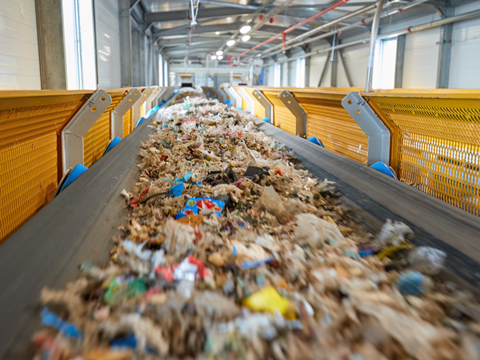
Schneider Electric and GR3N have partnered to develop the ‘first’ open automation system for advanced plastic recycling – which, in the scale-up of GR3N’s depolymerization technology, is set to reduce human error by 40% and engineering costs by 30%.
Based on alkaline hydrolysis, GR3N’s Microwave Assisted DEpolymerization (MADE) solution breaks PET down into its chemical building blocks, which can then be rebuilt into new PET pellets. Reportedly, the process results in packaging and textiles with comparable quality to those made of virgin plastics, while simultaneously unlocking circularity for hard-to-recycle plastics and handling a higher amount of impurities compared to existing technologies.
At its demonstration site in Italy, GR3N previously combined its MADE solution with EcoStruxure Automation Expert, Schneider Electric’s open automation technology. Now it is anticipated that MADE’s first industrial-scale facility – expected to be installed in Spain and achieve an annual capacity of over 40,000 ton/year of treated PET waste – will adopt the same solution.
Having signed a Memorandum of Understanding, the companies intend to quickly and cost-effectively scale chemical recycling operations to new sites. A 35-40kta plant is set to be built to cover the pre-treatment, depolymerization, and repolymerization of PET waste and reach industrial scale by 2027.
Christophe de Maistre, president Energy & Chemicals, Industrial Automation at Schneider Electric, commented: “Every year, people produce around 460 million tons of plastic, approximately 70% of which are sent to landfills or mismanaged.
“If we want to overcome the scale of plastic waste, there are certain non-negotiables. We must see integration across the whole product cycle, modularization to optimize and standardize engineering processes, as well as software-defined automation solutions that deliver scalability, break siloes, and act as a gateway to advanced analytics.
“This project with GR3N demonstrates all of these principles, improving flexibility, scalability and the efficiency of their solution and enabling them to grow to an industrial scale.”
Apparently, the MADE recycling plant is the first of its kind to use the shared automation runtime managed by Universal Automation, based on the IEC 61499 standard. The software-defined automation system decouples hardware from software and enables devices and equipment to be connected freely across architecture layers, no matter what manufacturer they come from.
Described as the ‘digital backbone’ of the plant’s industrial operations, it is expected to inform decisions – and, with the combination of OT and IT, apply advanced functionalities to operations management and data analytics.
“Through software-defined automation and hardware independence, we have been able to effectively de-risk our operations and push the boundaries of our technology,” added Fabio Silvestri, head of Marketing and Business Development at GR3N. “We’ve been able to reconfigure our systems quickly when we see opportunities to improve efficiency, while avoiding supply chain issues due the hardware agnostic nature of the system. This is what is needed to make advanced plastic recycling at reality at scale.”
As GR3N scales up its technology in pursuit of a ‘first-of-its-kind’ industrial plant, EcoStruxure Automation Expert claims to minimize the risk of investment and protect its intellectual property as the process licensor. It is said to avoid the challenges posed by vendor lock-in and supply chain issues with its vendor and hardware agnostic system, set to ‘design the best possible solution’.
The control software’s modular design is supported by digital continuity across the plant lifecycle, Schneider Electric explains. Automation-focused decision-making is said to happen at conception and reduce human error at the development stage by 40%, thus optimizing engineering time and time-to-market.
Furthermore, vendor independence means that controls can be centralized or distributed at will, while the integration of OT/IT incorporates advanced data analytics techniques – a feature set to provide ‘new opportunities for efficiency and optimization across the whole value chain’.
Additionally, its ‘software-defined’ approach is expected to lower engineering costs by 30%; and the similarity of the system to those in IT is anticipated to attract ‘the next generation of workers’.
In other news, EverestLabs’ RecycleOS, an AI robotics solution for recycling facilities, has been nominated for a Sustainability Award under the Commercialized Machinery. It is designed to provide visibility into sorting and recycling operations to increase packaging recycling rates, alongside insights that reclaimers and reprocessors can use to improve their feedstock yield and quality.
Meanwhile, the HolyGrail 2.0 initiative and GS1 aim to develop an Open Data Architecture for an intelligent sorting ecosystem using GS1’s GTIN standard. An open and interoperable system is set to digitize the sorting process for post-consumer packaging waste and bring accurate sorting to scale.
If you liked this story, you might also enjoy:
How are the top brands progressing on packaging sustainability?
Sustainable Innovation Report 2024: Current trends and future priorities
Reuse vs. single use – which is better for the environment?
The ultimate guide to global plastic sustainability regulation














No comments yet